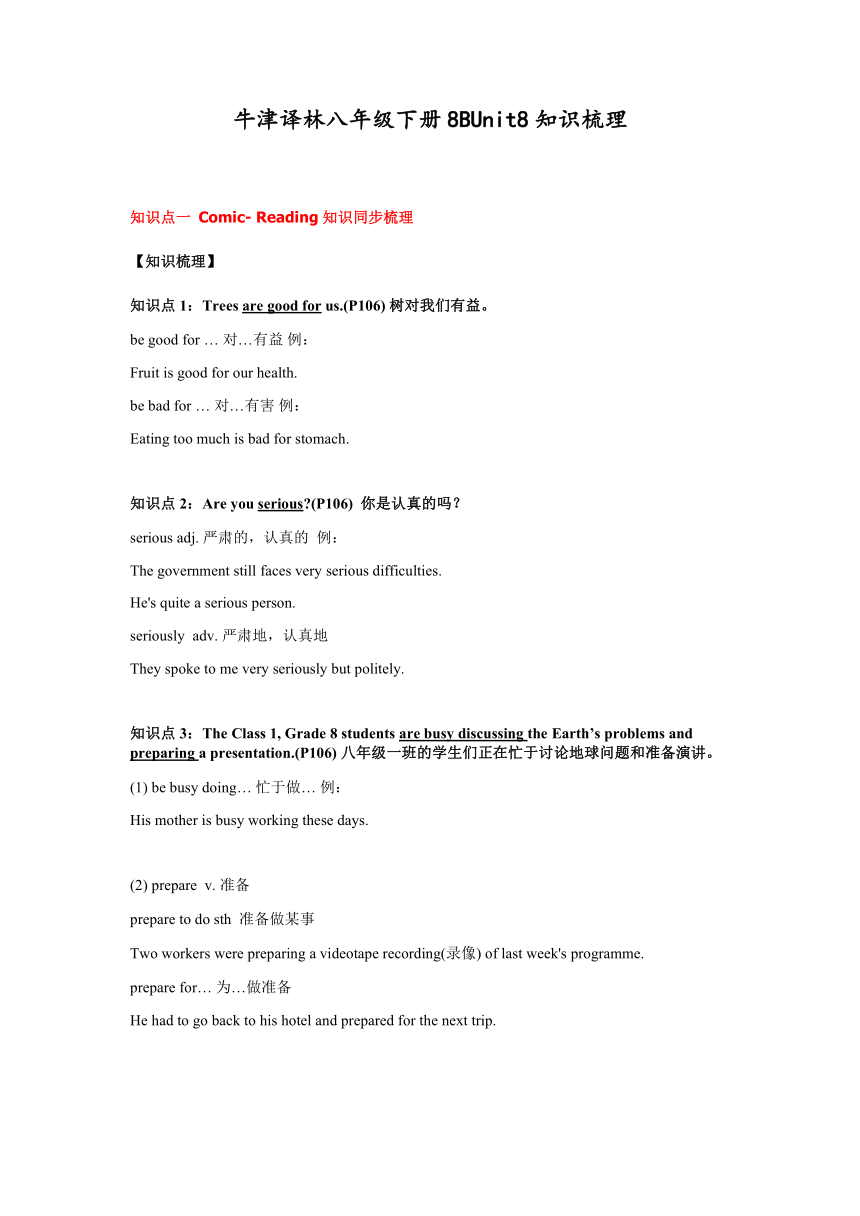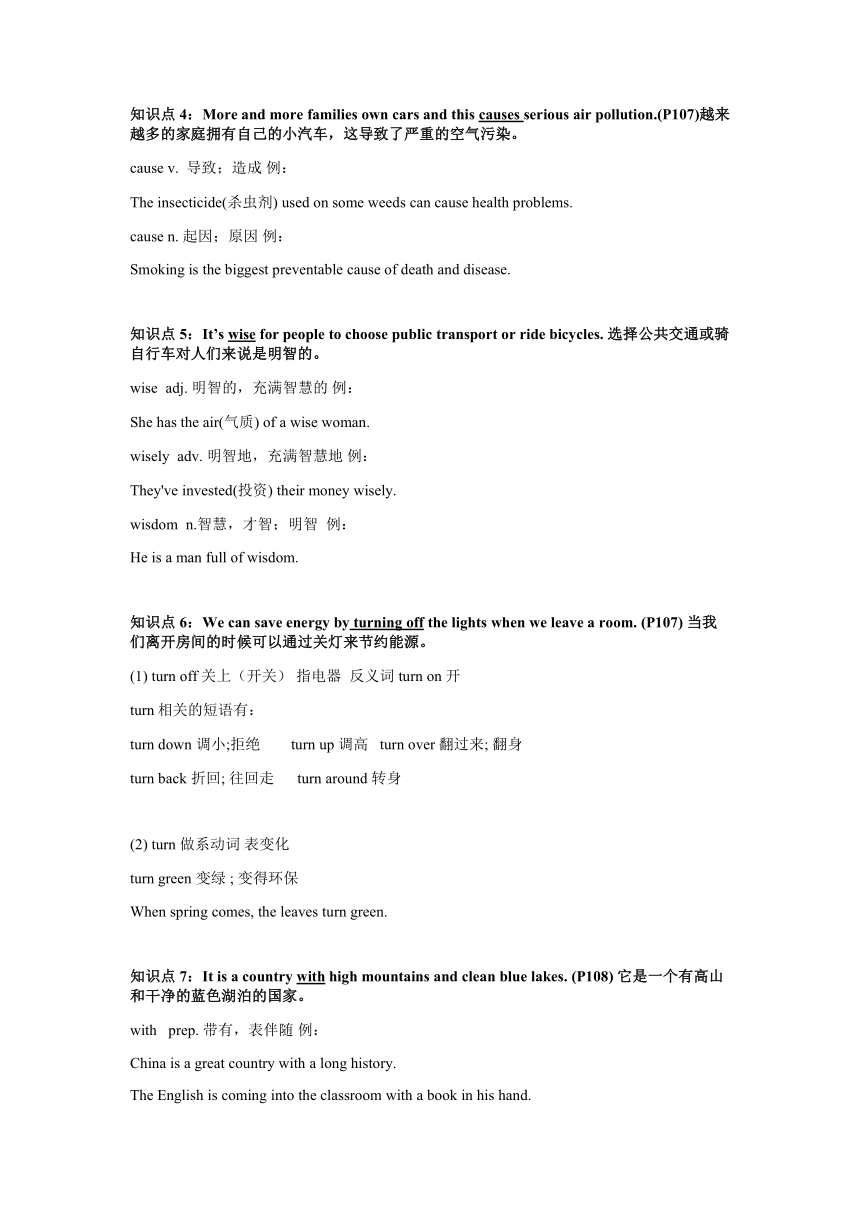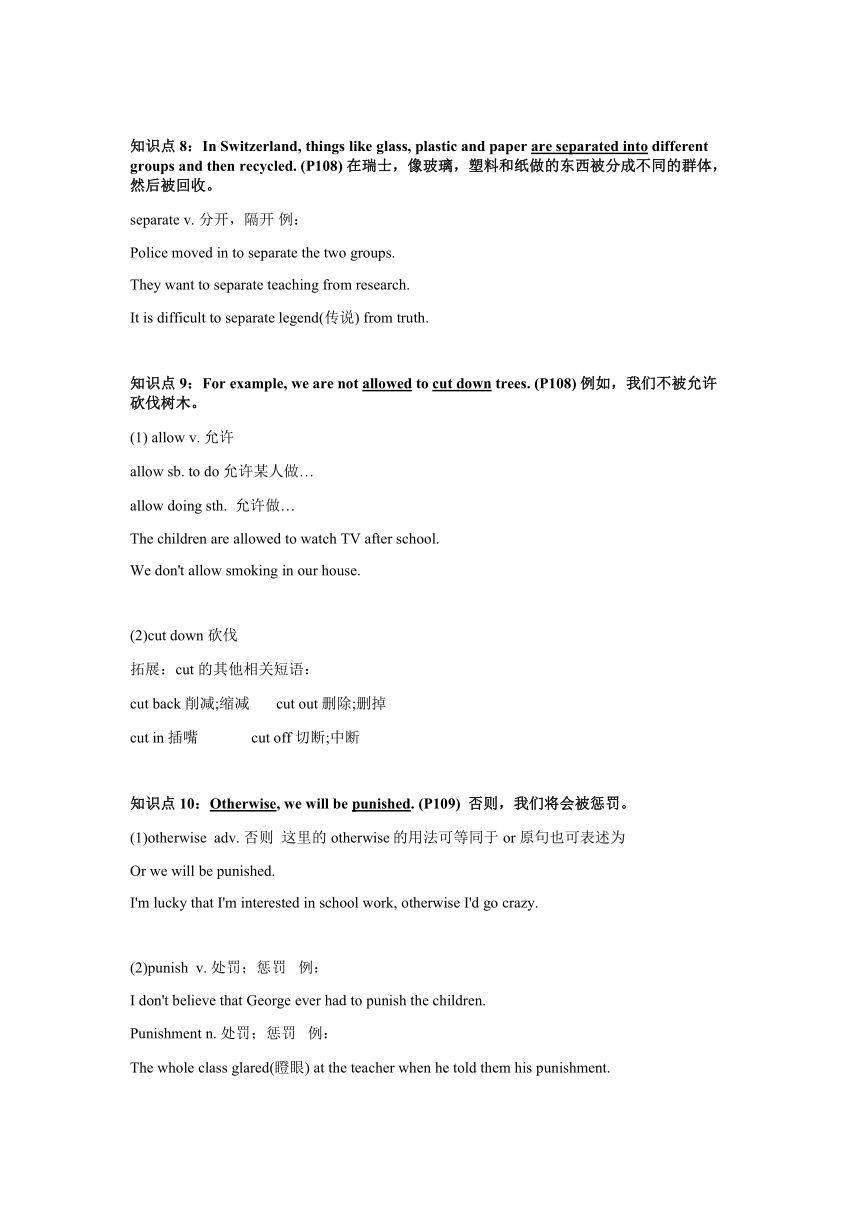牛津译林八年级下册Unit 8 A green world知识梳理
文档属性
| 名称 | 牛津译林八年级下册Unit 8 A green world知识梳理 |  | |
| 格式 | zip | ||
| 文件大小 | 39.0KB | ||
| 资源类型 | 教案 | ||
| 版本资源 | 牛津译林版 | ||
| 科目 | 英语 | ||
| 更新时间 | 2020-06-09 13:15:58 | ||
图片预览



文档简介
牛津译林八年级下册8BUnit8知识梳理
知识点一
Comic-
Reading知识同步梳理
【知识梳理】
知识点1:Trees
are
good
for
us.(P106)
树对我们有益。
be
good
for
…
对…有益
例:
Fruit
is
good
for
our
health.
be
bad
for
…
对…有害
例:
Eating
too
much
is
bad
for
stomach.
知识点2:Are
you
serious?(P106)
你是认真的吗?
serious
adj.
严肃的,认真的
例:
The
government
still
faces
very
serious
difficulties.
He's
quite
a
serious
person.
seriously
adv.
严肃地,认真地
They
spoke
to
me
very
seriously
but
politely.
知识点3:The
Class
1,
Grade
8
students
are
busy
discussing
the
Earth’s
problems
and
preparing
a
presentation.(P106)
八年级一班的学生们正在忙于讨论地球问题和准备演讲。
(1)
be
busy
doing…
忙于做…
例:
His
mother
is
busy
working
these
days.
(2)
prepare
v.
准备
prepare
to
do
sth
准备做某事
Two
workers
were
preparing
a
videotape
recording(录像)
of
last
week's
programme.
prepare
for…
为…做准备
He
had
to
go
back
to
his
hotel
and
prepared
for
the
next
trip.
知识点4:More
and
more
families
own
cars
and
this
causes
serious
air
pollution.(P107)越来越多的家庭拥有自己的小汽车,这导致了严重的空气污染。
cause
v.
导致;造成
例:
The
insecticide(杀虫剂)
used
on
some
weeds
can
cause
health
problems.
cause
n.
起因;原因
例:
Smoking
is
the
biggest
preventable
cause
of
death
and
disease.
知识点5:It’s
wise
for
people
to
choose
public
transport
or
ride
bicycles.
选择公共交通或骑自行车对人们来说是明智的。
wise
adj.
明智的,充满智慧的
例:
She
has
the
air(气质)
of
a
wise
woman.
wisely
adv.
明智地,充满智慧地
例:
They've
invested(投资)
their
money
wisely.
wisdom
n.智慧,才智;明智
例:
He
is
a
man
full
of
wisdom.
知识点6:We
can
save
energy
by
turning
off
the
lights
when
we
leave
a
room.
(P107)
当我们离开房间的时候可以通过关灯来节约能源。
(1)
turn
off
关上(开关)
指电器
反义词
turn
on
开
turn相关的短语有:
turn
down
调小;拒绝
turn
up
调高
turn
over
翻过来;
翻身
turn
back
折回;
往回走
turn
around
转身
(2)
turn
做系动词
表变化
turn
green
变绿
;
变得环保
When
spring
comes,
the
leaves
turn
green.
知识点7:It
is
a
country
with
high
mountains
and
clean
blue
lakes.
(P108)
它是一个有高山和干净的蓝色湖泊的国家。
with
prep.
带有,表伴随
例:
China
is
a
great
country
with
a
long
history.
The
English
is
coming
into
the
classroom
with
a
book
in
his
hand.
知识点8:In
Switzerland,
things
like
glass,
plastic
and
paper
are
separated
into
different
groups
and
then
recycled.
(P108)
在瑞士,像玻璃,塑料和纸做的东西被分成不同的群体,然后被回收。
separate
v.
分开,隔开
例:
Police
moved
in
to
separate
the
two
groups.
They
want
to
separate
teaching
from
research.
It
is
difficult
to
separate
legend(传说)
from
truth.
知识点9:For
example,
we
are
not
allowed
to
cut
down
trees.
(P108)
例如,我们不被允许砍伐树木。
(1)
allow
v.
允许
allow
sb.
to
do
允许某人做…
allow
doing
sth.
允许做…
The
children
are
allowed
to
watch
TV
after
school.
We
don't
allow
smoking
in
our
house.
(2)cut
down
砍伐
拓展:cut
的其他相关短语:
cut
back
削减;缩减
cut
out
删除;删掉
cut
in
插嘴
cut
off
切断;中断
知识点10:Otherwise,
we
will
be
punished.
(P109)
否则,我们将会被惩罚。
(1)otherwise
adv.
否则
这里的otherwise的用法可等同于or
原句也可表述为
Or
we
will
be
punished.
I'm
lucky
that
I'm
interested
in
school
work,
otherwise
I'd
go
crazy.
(2)punish
v.
处罚;惩罚
例:
I
don't
believe
that
George
ever
had
to
punish
the
children.
Punishment
n.
处罚;惩罚
例:
The
whole
class
glared(瞪眼)
at
the
teacher
when
he
told
them
his
punishment.
知识点11:…
We
will
be
fined
by
the
police.
(P109)
我们将会被警察罚款。
fine
v.
罚款
例:
She
was
fined
$300
and
banned(禁止)
from
driving
for
one
month.
fine
n.
罚金
例:
He
got
a
fine
because
of
parking
in
a
wrong
place.
fine
adj.
好的;美好的
例:
There
is
a
fine
view(风景)
of
the
countryside.
He
is
fine
after
seeing
the
doctor.
知识点12:We
depend
on
its
rich
resources
to
live,
so
it
is
important
for
us
to
protect
it
wisely.(P109)
我们依赖于它的丰富的资源来生活,所以对于我们来说明智地保护它是重要的。
depend
on
/upon
常用于情景交际中,表示“依…而定”
(1)
依靠,依赖,指望
例:
My
wife
and
daughter
depend
on
me
for
their
living.
(2)
取决于
例:
All
depends
on
the
weather.
dependent
adj.
依靠的;从属的;取决于…的
The
local
economy
is
dependent
on
oil
and
gas
extraction(提炼).
知识点13:These
new
types
of
energy
cost
very
little
and
will
never
run
out.(P109)这些新的能源形式花费很少而且将不会用尽。
run
out
用尽;耗尽
注意无被动用法
同义词:use
up
例:
Conditions
are
getting
worse
and
supplies(给养)
are
running
out.
run
out
of
用尽;耗尽;想不出
例:
They
have
run
out
of
ideas.
We're
running
out
of
time.
知识点14:Remember
that
everyone
can
do
something
to
make
a
difference!(P109)
(1)
make
a
difference
(to
sb/sth)
(对…)有影响,起作用
例:
Whatever
you
can
do
can
make
a
difference.
(2)
difference
n.
不同
different
adj.
不同的
反义词:same
知识点二
语法知识点梳理
【知识梳理】
知识点1:被动语态的一般将来时的含义
被动语态的一般将来时用来描述将要发生的动作。如:
He
will
be/is
going
to
be
taken
to
hospital
in
a
few
minutes.
The
food
will
be/is
going
to
be
eaten
by
the
dog
soon.
知识点2:被动语态的一般将来时的构成(以
support
为例)
时态
主语
will
be/be
going
to
be
过去分词
一般将来时
I
will
be/am
going
to
be
supported
You/We/They
will
be/are
going
to
be
He
/She/
It
will
be/is
going
to
be
注意:主语是第一人称时,被动语态的一般将来时也可以用“shall
be+动词的过去分词”来表达。
知识点三
Integrated
skills
知识点梳理
【知识梳理】
知识点1:Pollution
is
one
of
the
biggest
problems
in
the
world
today.(P114)今天污染是世界上最大的问题之一。
pollution
n.
污染
The
level
of
pollution
in
the
river
was
falling.
pollute
v.
污染
We
love
the
sea,
yet
we
pollute
it.
polluted
adj.
被污染的
The
police
have
warned
the
city's
inhabitants(居民)
not
to
swim
in
the
polluted
river.
知识点2:…more
living
things
will
be
killed
by
pollution.(P114)…更多的生物将会被污染杀死。
(1)
living
adj.
活着的,活的
The
living
things
can’t
live
without
sun.
the
living
指“活着的人”
(2)
lively
adj.
生动活泼的,生机勃勃的
She
had
a
sweet,
lively
personality.
(3)
alive
adj.
活着的,一般作表语
She
does
not
know
if
he
is
alive
or
dead.
批注:living
和alive的区别:
Living
不仅可以作表语,也可作定语位于名词前;而alive
只能作表语。
(4)live
adj.
活的
一般用于动物
A
protest
against
the
company's
tests
on
live
animals.
知识点3:The
Class
1,
Grade
8
students
want
to
do
a
survey
to
get
some
ideas
for
their
presentation
on
how
to
go
green.(P115)
八年级一班的学生们想要做一个调查为他们的演讲如何过绿色生活获取一些灵感。
survey
n.
调查
The
council(委员会)
did
a
survey
of
the
uses
to
which
farm
buildings
are
put.
知识点4:recycle
empty
bottles
(P115)回收空瓶子
empty
adj.
空的
反义词:full
满的
My
foot
stumped(踢)
some
empty
bottles,
which
woke
him
up.
知识点5:Air
pollution
is
harmful
to
our
health.(P116)空气污染对我们的健康有害。
harmful
adj.
有害的
be
harmful
to
对…有害
反义词:harmless
无害的
We
ought
to
reason
why
it
is
harmful
to
health
to
eat
too
much.
harm
v.
伤害
The
hijackers(劫机者)
seemed
anxious
not
to
harm
anyone.
n.
伤害
do
harm
to
对…有害
All
dogs
are
capable
of
doing
harm
to
human
beings.
知识点6:Trees
also
help
keep
soil
in
place
during
storms.(P116)树木也能在暴风雨期间帮助固定土壤在原处。
(1)
in
place
在正确位置
This
group
are
discussing
the
branching
strategy
currently
in
place.
(2)
place
v.
放置
Brand
folded
it
in
his
handkerchief
and
placed
it
in
the
inside
pocket
of
his
jacket.
n.
地方,地点
常见短语:take
place
发生;进行
take
the
place
of
代替,取代
My
wife
and
I
discovered
some
good
places
to
eat.
She
wanted
Randy's
wedding
to
take
place
quickly.
知识点7:They
will
form
over
thousands
or
even
millons
of
years.(P117)他们形成将需要超过成千甚至上万年。
form
v.
形成
They
tried
to
form
a
study
group
on
human
rights(权利).
n.
形式,形状;方式;表格
常见短语:
in
the
form
of
以…样的形式
You
will
notice
that
he
frames(架构)
his
analysis
in
the
form
of
a
debate.
知识点8:Here
are
some
simple
steps
to
take.(P117)这有些简单的步骤可以采取。
simple
adj.
简单的
simply
adv.
简单地
副词形式将le变为ly
类似的词还有:possible—possibly
probable—probably
gentle—gently,
terrible—terribly,
comfortable—comfortably
He
ate
a
simple
dinner
of
rice
and
beans.
step
n.
步骤;措施
take
steps
to
do
sth采取措施做某事
She
walked
on
a
few
steps.
We
should
take
steps
to
prevent
war.
知识点一
Comic-
Reading知识同步梳理
【知识梳理】
知识点1:Trees
are
good
for
us.(P106)
树对我们有益。
be
good
for
…
对…有益
例:
Fruit
is
good
for
our
health.
be
bad
for
…
对…有害
例:
Eating
too
much
is
bad
for
stomach.
知识点2:Are
you
serious?(P106)
你是认真的吗?
serious
adj.
严肃的,认真的
例:
The
government
still
faces
very
serious
difficulties.
He's
quite
a
serious
person.
seriously
adv.
严肃地,认真地
They
spoke
to
me
very
seriously
but
politely.
知识点3:The
Class
1,
Grade
8
students
are
busy
discussing
the
Earth’s
problems
and
preparing
a
presentation.(P106)
八年级一班的学生们正在忙于讨论地球问题和准备演讲。
(1)
be
busy
doing…
忙于做…
例:
His
mother
is
busy
working
these
days.
(2)
prepare
v.
准备
prepare
to
do
sth
准备做某事
Two
workers
were
preparing
a
videotape
recording(录像)
of
last
week's
programme.
prepare
for…
为…做准备
He
had
to
go
back
to
his
hotel
and
prepared
for
the
next
trip.
知识点4:More
and
more
families
own
cars
and
this
causes
serious
air
pollution.(P107)越来越多的家庭拥有自己的小汽车,这导致了严重的空气污染。
cause
v.
导致;造成
例:
The
insecticide(杀虫剂)
used
on
some
weeds
can
cause
health
problems.
cause
n.
起因;原因
例:
Smoking
is
the
biggest
preventable
cause
of
death
and
disease.
知识点5:It’s
wise
for
people
to
choose
public
transport
or
ride
bicycles.
选择公共交通或骑自行车对人们来说是明智的。
wise
adj.
明智的,充满智慧的
例:
She
has
the
air(气质)
of
a
wise
woman.
wisely
adv.
明智地,充满智慧地
例:
They've
invested(投资)
their
money
wisely.
wisdom
n.智慧,才智;明智
例:
He
is
a
man
full
of
wisdom.
知识点6:We
can
save
energy
by
turning
off
the
lights
when
we
leave
a
room.
(P107)
当我们离开房间的时候可以通过关灯来节约能源。
(1)
turn
off
关上(开关)
指电器
反义词
turn
on
开
turn相关的短语有:
turn
down
调小;拒绝
turn
up
调高
turn
over
翻过来;
翻身
turn
back
折回;
往回走
turn
around
转身
(2)
turn
做系动词
表变化
turn
green
变绿
;
变得环保
When
spring
comes,
the
leaves
turn
green.
知识点7:It
is
a
country
with
high
mountains
and
clean
blue
lakes.
(P108)
它是一个有高山和干净的蓝色湖泊的国家。
with
prep.
带有,表伴随
例:
China
is
a
great
country
with
a
long
history.
The
English
is
coming
into
the
classroom
with
a
book
in
his
hand.
知识点8:In
Switzerland,
things
like
glass,
plastic
and
paper
are
separated
into
different
groups
and
then
recycled.
(P108)
在瑞士,像玻璃,塑料和纸做的东西被分成不同的群体,然后被回收。
separate
v.
分开,隔开
例:
Police
moved
in
to
separate
the
two
groups.
They
want
to
separate
teaching
from
research.
It
is
difficult
to
separate
legend(传说)
from
truth.
知识点9:For
example,
we
are
not
allowed
to
cut
down
trees.
(P108)
例如,我们不被允许砍伐树木。
(1)
allow
v.
允许
allow
sb.
to
do
允许某人做…
allow
doing
sth.
允许做…
The
children
are
allowed
to
watch
TV
after
school.
We
don't
allow
smoking
in
our
house.
(2)cut
down
砍伐
拓展:cut
的其他相关短语:
cut
back
削减;缩减
cut
out
删除;删掉
cut
in
插嘴
cut
off
切断;中断
知识点10:Otherwise,
we
will
be
punished.
(P109)
否则,我们将会被惩罚。
(1)otherwise
adv.
否则
这里的otherwise的用法可等同于or
原句也可表述为
Or
we
will
be
punished.
I'm
lucky
that
I'm
interested
in
school
work,
otherwise
I'd
go
crazy.
(2)punish
v.
处罚;惩罚
例:
I
don't
believe
that
George
ever
had
to
punish
the
children.
Punishment
n.
处罚;惩罚
例:
The
whole
class
glared(瞪眼)
at
the
teacher
when
he
told
them
his
punishment.
知识点11:…
We
will
be
fined
by
the
police.
(P109)
我们将会被警察罚款。
fine
v.
罚款
例:
She
was
fined
$300
and
banned(禁止)
from
driving
for
one
month.
fine
n.
罚金
例:
He
got
a
fine
because
of
parking
in
a
wrong
place.
fine
adj.
好的;美好的
例:
There
is
a
fine
view(风景)
of
the
countryside.
He
is
fine
after
seeing
the
doctor.
知识点12:We
depend
on
its
rich
resources
to
live,
so
it
is
important
for
us
to
protect
it
wisely.(P109)
我们依赖于它的丰富的资源来生活,所以对于我们来说明智地保护它是重要的。
depend
on
/upon
常用于情景交际中,表示“依…而定”
(1)
依靠,依赖,指望
例:
My
wife
and
daughter
depend
on
me
for
their
living.
(2)
取决于
例:
All
depends
on
the
weather.
dependent
adj.
依靠的;从属的;取决于…的
The
local
economy
is
dependent
on
oil
and
gas
extraction(提炼).
知识点13:These
new
types
of
energy
cost
very
little
and
will
never
run
out.(P109)这些新的能源形式花费很少而且将不会用尽。
run
out
用尽;耗尽
注意无被动用法
同义词:use
up
例:
Conditions
are
getting
worse
and
supplies(给养)
are
running
out.
run
out
of
用尽;耗尽;想不出
例:
They
have
run
out
of
ideas.
We're
running
out
of
time.
知识点14:Remember
that
everyone
can
do
something
to
make
a
difference!(P109)
(1)
make
a
difference
(to
sb/sth)
(对…)有影响,起作用
例:
Whatever
you
can
do
can
make
a
difference.
(2)
difference
n.
不同
different
adj.
不同的
反义词:same
知识点二
语法知识点梳理
【知识梳理】
知识点1:被动语态的一般将来时的含义
被动语态的一般将来时用来描述将要发生的动作。如:
He
will
be/is
going
to
be
taken
to
hospital
in
a
few
minutes.
The
food
will
be/is
going
to
be
eaten
by
the
dog
soon.
知识点2:被动语态的一般将来时的构成(以
support
为例)
时态
主语
will
be/be
going
to
be
过去分词
一般将来时
I
will
be/am
going
to
be
supported
You/We/They
will
be/are
going
to
be
He
/She/
It
will
be/is
going
to
be
注意:主语是第一人称时,被动语态的一般将来时也可以用“shall
be+动词的过去分词”来表达。
知识点三
Integrated
skills
知识点梳理
【知识梳理】
知识点1:Pollution
is
one
of
the
biggest
problems
in
the
world
today.(P114)今天污染是世界上最大的问题之一。
pollution
n.
污染
The
level
of
pollution
in
the
river
was
falling.
pollute
v.
污染
We
love
the
sea,
yet
we
pollute
it.
polluted
adj.
被污染的
The
police
have
warned
the
city's
inhabitants(居民)
not
to
swim
in
the
polluted
river.
知识点2:…more
living
things
will
be
killed
by
pollution.(P114)…更多的生物将会被污染杀死。
(1)
living
adj.
活着的,活的
The
living
things
can’t
live
without
sun.
the
living
指“活着的人”
(2)
lively
adj.
生动活泼的,生机勃勃的
She
had
a
sweet,
lively
personality.
(3)
alive
adj.
活着的,一般作表语
She
does
not
know
if
he
is
alive
or
dead.
批注:living
和alive的区别:
Living
不仅可以作表语,也可作定语位于名词前;而alive
只能作表语。
(4)live
adj.
活的
一般用于动物
A
protest
against
the
company's
tests
on
live
animals.
知识点3:The
Class
1,
Grade
8
students
want
to
do
a
survey
to
get
some
ideas
for
their
presentation
on
how
to
go
green.(P115)
八年级一班的学生们想要做一个调查为他们的演讲如何过绿色生活获取一些灵感。
survey
n.
调查
The
council(委员会)
did
a
survey
of
the
uses
to
which
farm
buildings
are
put.
知识点4:recycle
empty
bottles
(P115)回收空瓶子
empty
adj.
空的
反义词:full
满的
My
foot
stumped(踢)
some
empty
bottles,
which
woke
him
up.
知识点5:Air
pollution
is
harmful
to
our
health.(P116)空气污染对我们的健康有害。
harmful
adj.
有害的
be
harmful
to
对…有害
反义词:harmless
无害的
We
ought
to
reason
why
it
is
harmful
to
health
to
eat
too
much.
harm
v.
伤害
The
hijackers(劫机者)
seemed
anxious
not
to
harm
anyone.
n.
伤害
do
harm
to
对…有害
All
dogs
are
capable
of
doing
harm
to
human
beings.
知识点6:Trees
also
help
keep
soil
in
place
during
storms.(P116)树木也能在暴风雨期间帮助固定土壤在原处。
(1)
in
place
在正确位置
This
group
are
discussing
the
branching
strategy
currently
in
place.
(2)
place
v.
放置
Brand
folded
it
in
his
handkerchief
and
placed
it
in
the
inside
of
his
jacket.
n.
地方,地点
常见短语:take
place
发生;进行
take
the
place
of
代替,取代
My
wife
and
I
discovered
some
good
places
to
eat.
She
wanted
Randy's
wedding
to
take
place
quickly.
知识点7:They
will
form
over
thousands
or
even
millons
of
years.(P117)他们形成将需要超过成千甚至上万年。
form
v.
形成
They
tried
to
form
a
study
group
on
human
rights(权利).
n.
形式,形状;方式;表格
常见短语:
in
the
form
of
以…样的形式
You
will
notice
that
he
frames(架构)
his
analysis
in
the
form
of
a
debate.
知识点8:Here
are
some
simple
steps
to
take.(P117)这有些简单的步骤可以采取。
simple
adj.
简单的
simply
adv.
简单地
副词形式将le变为ly
类似的词还有:possible—possibly
probable—probably
gentle—gently,
terrible—terribly,
comfortable—comfortably
He
ate
a
simple
dinner
of
rice
and
beans.
step
n.
步骤;措施
take
steps
to
do
sth采取措施做某事
She
walked
on
a
few
steps.
We
should
take
steps
to
prevent
war.
